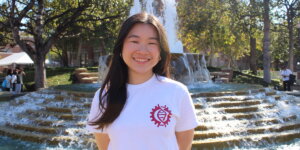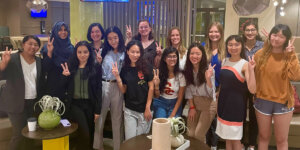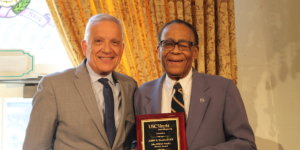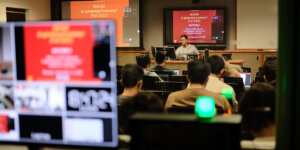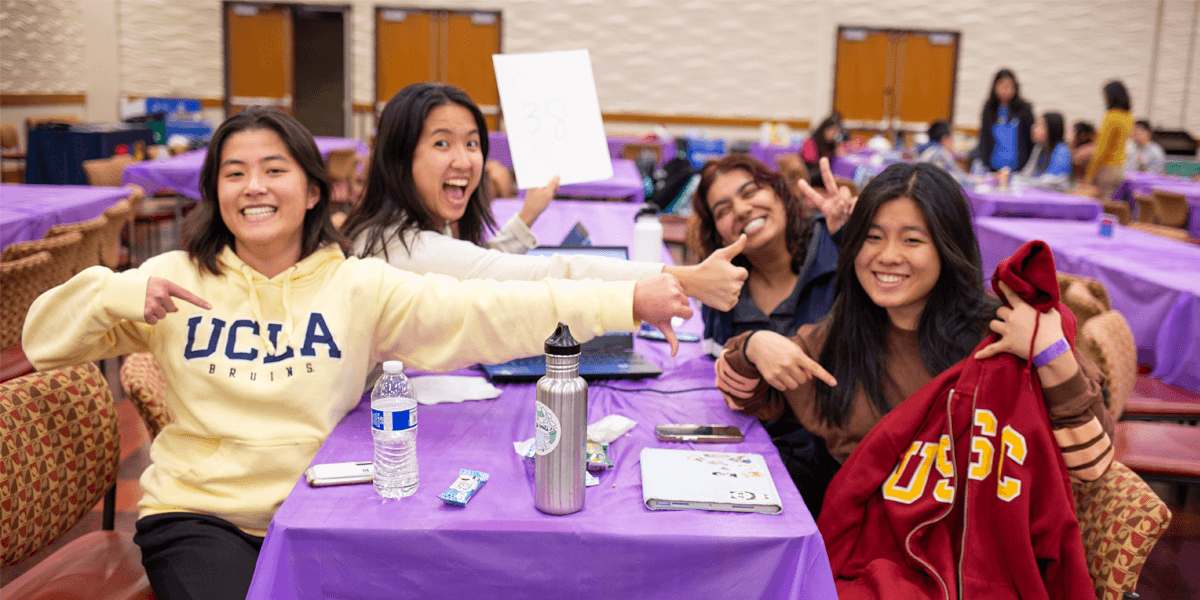
UCLA sophomore Juliet Zhang and USC sophomores Elena Li, Prableen Kaur and Amanda Lu show their school spirit as they wait for judging. Photo/Emilia Doda.
Hackathons can seem intimidating — especially for first-time hackers. But USC’s AthenaHacks, Southern California’s premier hackathon for marginalized gender identities, hopes to change that by answering a crucial question: How can we help gender minorities in tech feel more comfortable in a space where they belong?
On Feb. 25-26, more than 400 undergraduate and graduate students from marginalized gender identities came together for AthenaHacks, held at the Ronald Tutor Campus Center and online in a hybrid format. Students from across the city, state, country and even the world participated in the hackathon, from East Asia to Europe and South America.
For 24 hours, teams of up to four students were prompted with creating solutions — from websites and prototypes to games — for issues such as sustainability and community building. Teams then brainstormed ideas, built tangible solutions and pitched to judges, including industry professionals, AthenaHacks alumni, USC professors and Ph.D. students for prizes.
The entire event — back for its seventh year — was run by students on the AthenaHacks organizing team, from obtaining sponsorship to fund the event to designing merchandise for hundreds of participants, 35 mentors and 10 volunteers. Seven companies and organizations such as Bloomberg and Meta sponsored the event.
For many on the team, AthenaHacks’ mission hits close to home.
“I participated in one hackathon when I was in high school,” said Ipek Goktan, a USC junior majoring in computer science and one of the co-leads of the programs committee at AthenaHacks. “I was one of four women out of 400 participants, so when I heard that AthenaHacks was an entire hackathon for marginalized gender identities, I thought it was really cool.”
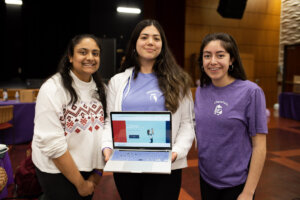
USC freshman Samyu Vakkalanka, USC junior Helin Yilmaz and USC junior Leslie Garcia-Sanchez present their project, Climb. Photo/Emilia Doda.
Where to start?
One of the barriers to entry of hackathons for minorities is a potential lack of resources, including beginner-friendly spaces. To mitigate this issue, AthenaHacks is intended to create a welcoming space for those who have never participated before, from pre-event beginner-friendly technical workshops to the sheer number of volunteer mentors.
“With a hackathon that is targeting a minority audience within this tech space, it’s very important to have that nurturing, supportive environment where it’s okay to make mistakes and it’s okay to not have a fully finished project by the end,” said Melanie Toh, a USC junior majoring in computer science and the head of marketing at AthenaHacks.
The AthenaHacks alumnae community also rallies together to bring a culture of “paying it forward.”
“Former beginners who learned how to code at AthenaHacks will oftentimes come back as mentors,” Toh said. “The kindness doesn’t stop simply at just teaching beginners how to code. It’s also coming back and helping people that were just like you to do the same thing.”
A welcoming environment
Those with previous hackathon experience were still able to revel in the welcoming environment at AthenaHacks. Anna Hagiwara, a junior majoring in electrical engineering and computer science at UC Berkeley, jumped on the chance to participate.
“I think hackathons are definitely something that are really scary when you’re probably going to be one of the few non-male people in the room,” Hagiwara said. “It was really inspiring to know that you’re going to a place where you’re going to feel very welcomed, and no one is going to have these preconceived notions about you based on your gender.”
During the event, 42 teams submitted projects, ranging from a financial literacy site to a text notification application notifying users about the stage of their menstrual cycle. Overall, 11 prize categories were awarded, from “Best Energy Innovation Hack” sponsored by Chevron to “Best Beginner.” WARmen, a game aiming to battle stereotypes and societal pressures placed on women, took away the “Best Overall” prize.
USC freshmen Campbell Nystrom, Maia Piechocki, Ashly Lam and Ahona Karim created Take a Paws, which won the “Best Domain Name” award. On their website, users can set a timer and work for a selected duration. When the timer ends, the website plays music and displays a random exercise. All four members had never attended a hackathon before.
“It wasn’t as competitive or cutthroat as I thought a hackathon would be,” Piechocki said. “I thought we’d be debugging for hours. There were some aspects where it was just like, ‘Wow, we did that.’”
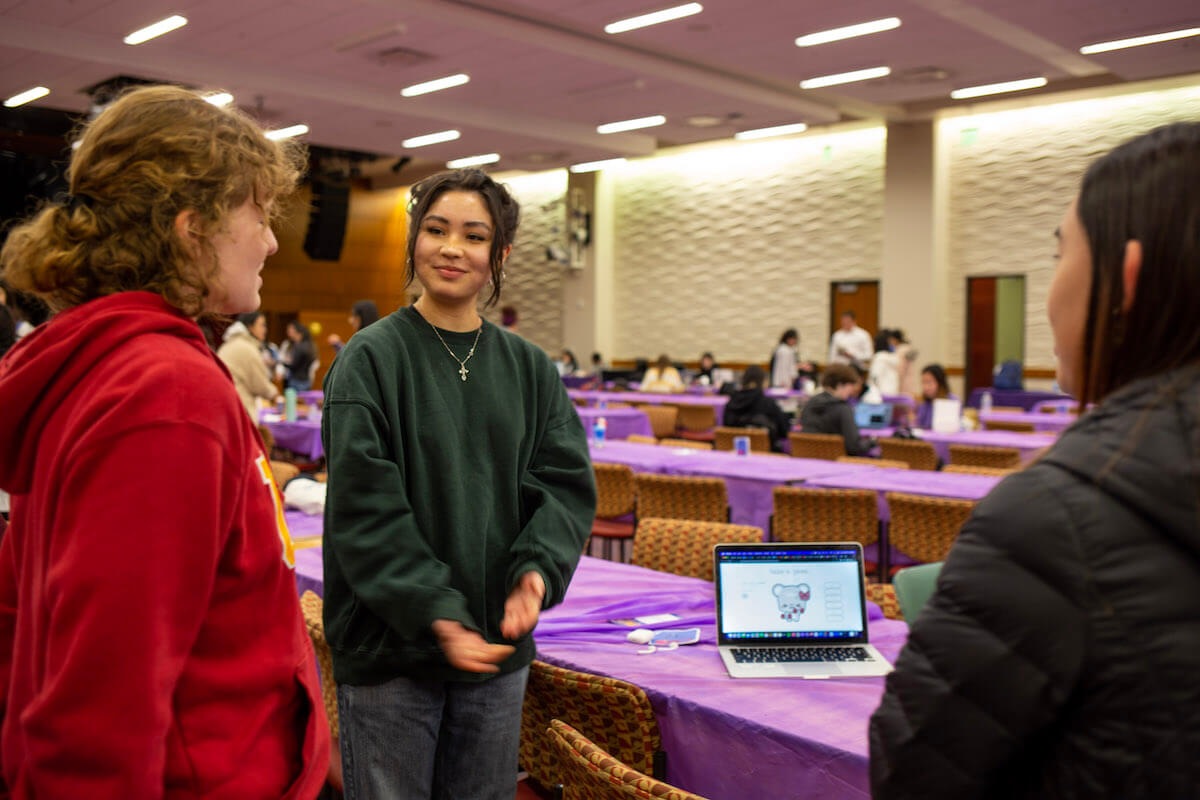
USC freshmen Campbell Nystrom and Maia Piechocki present their project, Take a Paws. Photo/Emilia Doda.
USC sophomores Amanda Lu and Prableen Kaur and UCLA sophomore Juliet Zhang were part of another team that created spotivibe with the goal of creating Spotify playlists that match keywords users share.
“The user can input a prompt and then it’ll automatically generate a playlist of songs that match the prompt,” Zhang said. “We’d like to add functionality where the user can just save that directly to their Spotify account.”
Try new things
After all this hacking, students shared their future goals in the tech sphere.
“In my future, I want to work closely with robotics, design robots in CAD software and either 3D-print it or see it implemented in automation,” said Elena Li, a USC sophomore majoring in mechanical engineering and minoring in technical game art.
Kaur took a totally different perspective, illustrating that computer science is truly an interdisciplinary field.
“I’m really interested in environmental tech. I love learning about the environment, and I want to use my skills to make a career out of that,” Kaur said.
In the end, the organizers wanted the event to be a place where students could take risks in tech without worrying about failure or fear of the unknown. After all, who knows where the field will be in a decade?
“It’s all about being an advocate for yourself and trying out these new things.” Ipek Goktan
“Put yourself out there,” Goktan said. “When I first got into computer science, I was very self-conscious. I also have been in that situation where I was the only woman, for example, on my robotics team, the only woman on a hackathon team. It’s all about being an advocate for yourself and trying out these new things.”
Published on March 24th, 2023
Last updated on March 24th, 2023




